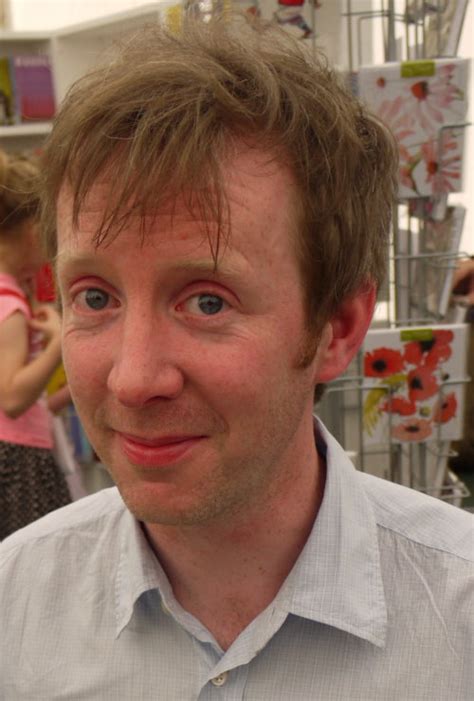Top 321 Weave Quotes & Sayings - Page 6
Explore popular Weave quotes.
Last updated on December 18, 2024.
Maybe instead of strings it's stories things are made of, an infinite number of tiny vibrating stories; once upon a time they all were part of one big giant superstory, except it got broken up into a jillion different pieces, that's why no story on its own makes any sense, and so what you have to do in a life is try and weave it back together, my story into your story, our stories into all the other people's we know, until you've got something that to God or whoever might look like a letter, or even a whole word.
If I had lady-spider legs, I would weave a sky where the stars lined up. Matresses would be tied down tight to their trucks, bodies would never crash through windshields. The moon would rise above the wine-dark sea and give babies only to maidens and musicians who had prayed long and hard. Lost girls wouldn't need compasses or maps. They would find gingerbread paths to lead them out of the forest and home again. They would never sleep in silver boxes with white velvet sheets, not until they were wrinkled-paper grandmas and ready for the trip.
Perhaps he could still weave together the broken threads of his life. And yet, I wanted him here now. I needed him here. In the darkness, if I sat very still, I could almost feel his presence by me, quite near, but not too near. Didn't I promise to keep you safe, he would say softly. I have never broken a promise. Don't look so worried, Jenny. And yet, he would be careful. Careful not to move too close. Careful not to frighten me. Waiting still. I am your shelter. Don't be afraid.
I don't think that there's a target audience at all. These stories were in circulation. The stories were told by men, told in the marketplace by men, but also behind doors by women, but there's no real record of this. It's likely they were told by women to children in their interior rooms. The story could be a negative story, they could be presented as a, "Watch out! Women will get round you, do things to you, weave you in their toils." It could be buried in it an old cautionary story about women and their wiles.
The souls of people, on their way to Earth-life, pass through a room full of lights; each takes a taper - often only a spark - to guide it in the dim country of this world. But some souls, by rare fortune, are detained longer - have time to grasp a handful of tapers, which they weave into a torch. These are the torch-bearers of humanity - its poets, seers and saints, who lead and lift the race out of darkness, toward the light. They are the law-givers and saviors, the light-bringers, way-showers and truth-tellers, and without them, humanity would lose its way in the dark.
The gods weave misfortunes for men, so that the generations to come will have something to sing about.” Mallarmé repeats, less beautifully, what Homer said; “tout aboutit en un livre,” everything ends up in a book. The Greeks speak of generations that will sing; Mallarmé speaks of an object, of a thing among things, a book. But the idea is the same; the idea that we are made for art, we are made for memory, we are made for poetry, or perhaps we are made for oblivion. But something remains, and that something is history or poetry, which are not essentially different.
Scientists say every action initiates an equal and opposite reaction. I say that's just the start. I say every action initiates a most unequal and upredictable chain reaction, that every filament of living becomes part of a larger weave, while remaining identifiable. That every line of latitude requires several stripes of longitude to obtain meaning. That every universe is part of a bigger heaven, a heaven of rhythm and geometry, where a heartbeat is the apex of a triangle.
Christmas Eve, and twelve of the clock. "Now they are all on their knees," An elder said as we sat in a flock By the embers in hearth-side ease. We pictured the meek mild creatures where They dwelt in their strawy pen, Nor did it occur to one of us there To doubt they were kneeling then. So fair a fancy few would weave In these years! yet, I feel If someone said on Christmas Eve, "Come; see the oxen kneel, In the lonely barton by yonder coomb Our childhood used to know," I should go with him in the gloom, Hoping it might be so.
What I need is perspective. The illusion of depth, created by a frame, the arrangement of shapes on a flat surface. Perspective is necessary. Otherwise there are only two dimensions. Otherwise you live with your face squashed up against a wall, everything a huge foreground, of details, close-ups, hairs, the weave of the bedsheet, the molecules of the face. Your own skin like a map, a diagram of futility, criscrossed with tiny roads that lead nowhere. Otherwise you live in the moment. Which is not where I want to be.
I try to weave a secret into each plot. It's the thread that holds the rest of the story fabric together. In fact, it's the reason for the story. I hint at the secret early on. Immediately I want the reader to get the feeling that something here isn't quite right. It helps maintain the suspense if a puzzling element is introduced in the first few pages of the book, but the answer isn't revealed until the final ones. Hopefully, readers want to know what the heck is really going on, and it's the desire to find out that keeps them turning pages.
When you work you fulfill a part of earth's furthest dream, assigned to you when that dream was born, And what is it to work with love? It is to weave the cloth with threads drawn from your heart, even as if your beloved were to wear that cloth. It is to build a house with affection, even as if your beloved were to dwell in that house. It is to sow seeds with tenderness and reap the harvest with joy, even as if your beloved were to eat the fruit. It is to charge all things you fashion with a breath of your own spirit. Work is love made visible
At the end of the day, if I do a set at a festival and I only have an hour, which is kind of short for a DJ set, I know that I have to play at least six of my songs. Then the whole challenge is what do I weave around that. How do I stand out? Because at a festival there's probably fifteen songs every DJ's going to play every hour, for the whole day. That to me is more interesting, because I still feel like an outsider in this world.
The FlowersAll the names I know from nurse:Gardener's garters, Shepherd's purse,Bachelor's buttons, Lady's smock,And the Lady Hollyhock.Fairy places, fairy things,Fairy woods where the wild bee wings,Tiny trees for tiny dames-These must all be fairy names!Tiny woods below whose boughsShady fairies weave a house;Tiny tree-tops, rose or thyme,Where the braver fairies climb!Fair are grown-up people's trees,But the fairest woods are these;Where, if I were not so tall,I should live for good and all
And it's kind of my own fault too, in the sense that I've used my own life as a literary device so much. I think people feel very comfortable reviewing the idea of me, as opposed to what I've actually written. I find that most of the time, when people write about one of my books, they're really just writing about what they think I may or may not represent, as sort of this abstract entity. Is that unfair? Not really. If I put myself in this position where I'm going to kind of weave elements of memoir into almost everything, well, I suppose that's going to happen.
A friend of mine who writes history books said to me that he thought that the two creatures most to be pitied were the spider and the novelist - their lives hanging by a thread spun out of their own guts. But in some ways I think writers of fiction are the creatures most to be envied, because who else besides the spider is allowed to take that fragile thread and weave it into a pattern? What a gift of grace to be able to take the chaos from within and from it to create some semblance of order.
The memories which peaceful country scenes call up, are not of this world, nor of its thoughts and hopes. Their gentle influence may teach us how to weave fresh garlands for the graves of those we loved: may purify our thoughts, and bear down before it old enmity and hatred; but beneath all this, there lingers, in the least reflective mind, a vague and half-formed consciousness of having held such feelings long before, in some remote and distant time, which calls up solemn thoughts of distant times to come, and bends down pride and worldliness beneath it.
But deepest of all illusory Appearances, for hiding Wonder, as for many other ends, are your two grand fundamental world-enveloping Appearances, SPACE and TIME. These, as spun and woven for us from before Birth itself, to clothe our celestial ME for dwelling here, and yet to blind it, lie all-embracing, as the universal canvas, or warp and woof, whereby all minor Illusions, in this Phantasm Existence, weave and paint themselves. In vain, while here on Earth, shall you endeavor to strip them off; you can, at best, but rend them asunder for moments, and look through.
The poems in Katherine Soniat's new collection, The Swing Girl, weave emotion's 'spray going farther than thought' with the 'bedrock things' of the trod-upon world. These poems eddy and pool in unpredictable and often surprising ways, much as the mind moves in its twilight state between waking and sleep. The fluidity of their cadence and the luminosity of their imagery carry the reader to the wellspring of poetry itself, that deep delight of which Robert Penn Warren spoke, whose source is, in Soniat's words, 'beauty on its way to being mystery.'
The Deliverator belongs to an elite order, a hallow subcategory. He's got esprit up to here. Right now, he is preparing to carry out his third mission of the night. His uniform is black as activated charcoal, filtering the very light out of the air. A bullet will bounce off its arachnofiber weave like a wren hitting a patio door, but excess perspiration wafts through it like a breeze through a freshly napalmed forest. Where his body has bony extremities, the suit has sintered armorgel: feels like gritty jello, protects like a stack of telephone books.
Myth is the practical metabolism of our soulish life, the logic of our obsessions and oversights for which we have no language or code. Myth is the "morality" that the ineffable puts upon us, our unaccountable imperatives, our inexplicably selective clarity and obscurity, the mortal one-sidedness of our talents and wits, the passion and apathy that make such a transient passage through our hapless minds; that weave a pattern of fatality others will see before we do. Myth is distinctively human or sublime higher-order instinct, the "reason" in culture that reason knows not of.
Will you teach your children what we have taught our children? That the earth is our mother? What befalls the earth befalls all the sons of the earth. This we know: the earth does not belong to man, man belongs to the earth. All things are connected like the blood that unites us all. Man did not weave the web of life, he is merely a strand in it. Whatever he does to the web, he does to himself. One thing we know: our god is also your god. The earth is precious to him and to harm the earth is to heap contempt on its creator.




















